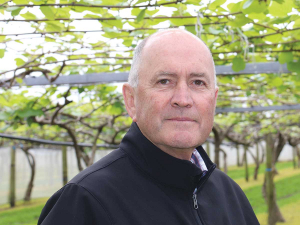EPA remains committed to deliver improved outcomes
OPINION: At the end of my first year as chair of the Environmental Protection Authority (EPA), I have been reflecting on the progress made in the time I have been in the role.
 Hort NZ chair Barry O’Neil says the issues raised about RSE workers’ treatment are being blown out of all proportion.
Hort NZ chair Barry O’Neil says the issues raised about RSE workers’ treatment are being blown out of all proportion.
Horticulture NZ's chair has hit back at claims that the RSE workers are being treated like “slaves” and that the ill treatment of them is “systemic”.
Barry O’Neil, a kiwifruit grower since the 1980s, has worked for both MPI and Kiwifruit Vine Health. He says the issues raised are being blown out of all proportion.
“I reject a number of the accusations being made and am very concerned about suggestions that industry is not complying with the strict conditions laid down for the employment of RSE workers,” he told Rural News.
“I have yet to find accommodation that I would categorise in the bad territory.”
However, O’Neil does concede that in a scheme of 19,000 RSE workers there will be one or two individuals who will not meet the standards. But he says the Labour Inspectorate has been very quick to identify those who break the rules.
O’Neil adds that the RSE scheme is very hard to get into because of the strict compliance conditions that employers must meet.
Rural News was recently told by a major grower that the conditions are so strict and the cost of meeting these so high and time consuming that they avoid employing RSE workers where possible. Others have said that the problem is anything but systemic and that certain individuals are making accusations to benefit their own particular causes.
O’Neil points out in a number of cases the RSE workers themselves decide how many of them will be in a room. He says they come from environments where communal sleeping arrangements are common. “Often RSE workers prefer to be in rooms where there are others, rather than being on their own."
He adds that employers generally give RSE workers an opportunity to have a room of their own, but that they seldom take up this offer.
“We have got to remember that this scheme has been reviewed by the World Bank and judged as the best mobility seasonal labour scheme in the world,” O’Neil says.
As New Zealand marks the United Nations’ International Year of the Woman Farmer 2026 (IYWF 2026), industry leaders are challenging the misconception that women only support farming.
Fonterra’s impending exit from the Australian dairy industry is a major event but the story doesn’t change too much for farmers.
Expect greater collaboration between Massey University’s school of Agriculture and Environment and Ireland’s leading agriculture university, the University College of Dublin (UCD), in the future.
A partnership between Torere Macadamias Ltd and the Riddet Institute aims to unlock value from macadamia nuts while growing the next generation of Māori agribusiness researchers.
A new partnership between Dairy Women’s Network (DWN) and NZAgbiz aims to make evidence-based calf rearing practices accessible to all farm teams.
Despite some trying circumstances recently, the cherry season looks set to emerge on top of things.

OPINION: Here w go: the election date is set for November 7 and the politicians are out of the gate…
OPINION: ECan data was released a few days ago showing Canterbury farmers have made “giant strides on environmental performance”.